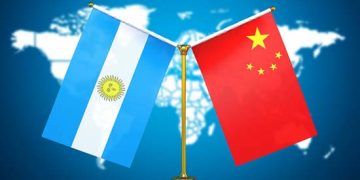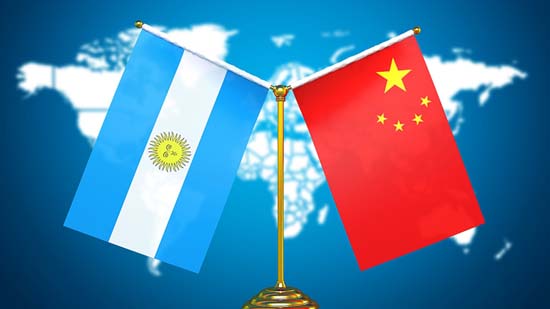CGTN
China National Nuclear Corp. (CNNC) signed a contract with Nucleoeléctrica Argentina S.A. to build Argentina’s Atucha III nuclear power plant using China’s home-developed Hualong One technology, CNNC officially announced on February 1. The project is groundbreaking for the Chinese nuclear industry and is a perfect example of win-win cooperation.
For starters, the deal is huge for both sides and is a prelude to Argentina’s inclusion in the Belt and Road Initiative (BRI) sometime in 2022. The announcement for this has been timed as such to commemorate the 50-year anniversary of the establishment of diplomatic relations between the two countries.
It also shows how far things have come for both sides. In April 2020, China officially became Argentina’s largest trading partner largely thanks to huge imports of Argentinian soybeans, beef, shrimp and vegetable oils. However, the two are eyeing deeper cooperation on agriculture and renewable energy, such as lithium battery-powered vehicles, and tourism.
China is filling Argentina’s foreign direct investment (FDI) needs by stepping up to finance key infrastructure projects, as well. After defaulting on foreign debt in 2001 and similar debt troubles in the mid-to-late 2010s, many non-Chinese multinational corporations have since pulled out of the South American country. China, on the other hand, is taking a different route and making wise investments in tangible assets – like the Atucha III nuclear power plant.
This project is huge for China’s nuclear energy industry. First of all, it’s China’s second overseas nuclear project after two units that were built in Pakistan. However, Pakistan has limited options for its nuclear energy demands due to sanctions and so CNNC’s project in Argentina is truly the first Chinese nuclear power contract to win in a competitive market.
It’s also significant because of Argentina’s long history in nuclear research. Argentina produced Latin America’s first research reactor in 1957 and completed its first nuclear power plant in 1974. This implies that China’s Hualong One technology is of exceptional quality and could be more widely used around the world in the future.
In Latin America alone, there is certainly room for potential. Currently, there are only seven nuclear power plants in operation – three in Argentina, two in Brazil and two in Mexico. According to the World Bank, they collectively produce 0.7 percent of the region’s total energy consumption, representing a huge opportunity for expansion.
Of course, this is bound to catch headlines in the American media for all the wrong reasons – including the usual “at what cost?” takes. The U.S. government has consistently targeted China’s nuclear energy sector and accused China of creating an “energy dependence” situation.
The U.S. has taken an active role in ensuring that similar projects from other Chinese nuclear companies such as China General Nuclear Power Group (CGN) have been shunned out of places like the United Kingdom and the Czech Republic. It has also gone so far as to directly sanction CNNC’s peer, CGN, and has some of CNNC’s fuel-related subsidiaries under sanctions.
Several things undermine this narrative, however, and the most obvious one is that no empirical evidence suggests this is the case. As I already mentioned, this plant would be only the second instance of China exporting its nuclear technology. There is no instance that U.S. officials can point to as evidence that their “debt-trap diplomacy” smear is actually true.
Another thing to consider is the fact that this project dates back to a 2012 plan of action agreement signed between the two governments, but was later shelved due to political and financial constraints. That is, the project was envisaged years before the current fall-off in relations between China and the United States, where the alarmism about China’s diplomatic agenda emanates.
This is not some kind of theater in the ongoing U.S.-China rivalry that was sparked by Washington during the administration of former President Donald Trump. Rather, the deal between Argentina and China is exactly that: a deal between two countries. Per long-standing international customs and norms, countries are allowed to make deals however they see fit based on their particular needs and interests. Naysayers in Washington had better get used to it as China’s high-tech sectors continue to become more competitive globally.




